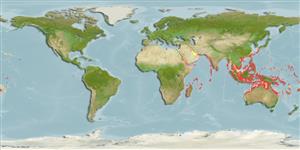分類 / Names
俗名 | 同種異名 | Catalog of Fishes(屬, 種) | ITIS | CoL | WoRMS | Cloffa
Teleostei >
Eupercaria/misc (Various families in series Eupercaria)
鱸形目 (Various families in series Eupercaria) >
Caesionidae (Fusiliers)
烏尾鮗科 (Fusiliers) > Caesioninae
Etymology: Caesio: Latin, caesius, bluish-grey, 1835; it is the same name given to the silvery metal (Cs) (Ref. 45335).
More on author: Lacepède.
Environment: milieu / climate zone / depth range / distribution range
生態學
海洋 礁區魚類; 非遷移的; 深度上下限 1 - 60 m (Ref. 30874). 熱帶; 34°N - 31°S, 30°E - 116°W (Ref. 94071)
Indo-West Pacific: Red Sea and East Africa to Samoa, north to southern Japan, south to New Caledonia. Absent in the Arabian (Persian) Gulf.
印度-西太平洋: 紅海而且東非到美屬薩摩亞, 北至日本南部, 南至新加勒多尼亞。 不存在於波斯灣。
大小 / 重量 / 年齡
Maturity: Lm ? range ? - ? cm
Max length : 45.4 cm FL 雄魚/尚未辨別雌雄; (Ref. 125599); common length : 25.0 cm TL 雄魚/尚未辨別雌雄; (Ref. 39189); 最大體重: 1.6 kg (Ref. 125599)
背棘 (總數): 10; 背的軟條 (總數): 14-16; 臀棘 3; 臀鰭軟條: 10 - 12. This species is distinguished by the following characters: postmaxillary process single; A III,12 (rarely 13); lateral line scales 57-65 (usually around 61); scale rows on spinous part of dorsal fin horizontal; supratemporal bands of scales often interrupted at dorsal midline by a scaleless zone, always a V-shaped scaleless zone anteriorly at midline intruding between the supratemporal band of scales; body colour with upper body bluish and the lower white to pale bluish; a single yellow or golden stripe directly above lateral line except on caudal peduncle where it is about 1 scale above lateral line, the yellow stripe 2 or 3 scales wide, bordered directly above and below by a white or light blue stripe which is about 1 scale wide, caudal-fin lobes with a black median streak (Ref. 68703).
在頰上有三到五個鱗片; 22-25個前背的鱗片; 背鰭與臀鰭覆有鱗片的。 鱗片的前期暫時條紋在中線前面地時常被一個 V 形無鱗片的區域中斷。 上柄的鱗片列通常 11(10-12); 下柄的鱗片列通常 15.(14-15) 在 Baudelot 的結帶的附著的基枕骨的每個腹側表面方面的一種小的突起, 在分開從骨阜它的基枕骨的腹面上的一個突出的凹窪。 後顎的突起單個; 顎骨的後端鈍的。 顏色: 身體上半部藍色的, 身體下半部白色到灰藍色的。 金的條紋從眼睛上方, 筆直地跑沿著對上尾部的梗身體而且繼續上葉的尾鰭到頂端, 變成接近黑色的鰭之上。 第二個在下葉中的相似條紋.(參考文獻 48636)
Adults are found in schools in deep lagoons and along seaward reefs in coastal areas (Ref. 9710), mixing with other species of fusiliers (Ref. 48636). Juveniles are used as tuna bait fish. They are oviparous, with small pelagic eggs (Ref. 402). Maximum depth reported taken from Ref. 128797.
棲息於沿岸區域, 主要地珊瑚礁的周圍。 成群出現在深的潟湖中而且沿著臨海礁石 (參考文獻 9710), 以其他種的笛鯛科魚類混合.(參考文獻 48636) 稚魚用作了鮪魚誘餌魚。 卵生的, 與小型大洋性魚類卵.(參考文獻 402)
Life cycle and mating behavior
成熟度 | 繁殖 | 產卵場 | 卵 | 孕卵數 | 仔魚
Mating behavior is marked by six distinguishable patterns, namely: 1) nuzzling; 2) several males joining in courtship; 3) spiraling towards the surface; 4) pair spawning; 5) sperm release by sneakers; and 6) post spawning.
Nuzzling is done about 1-1.5 hours before spawning. For most of the day the fish swam slowly in school. At nearly spawning time, one or two males approach a selected female and begin pecking and pushing her swollen abdomen with their snouts. Interruption happens at this stage resulting in spawners returning to the school. With less than an hour until spawning, 2-6 males may attempt to get their abdomen as close to the female's abdomen as possible. For the pair that completes this position, a spiraling ascent to the surface occurs followed by a release of both eggs and sperm while other males come in pursuit. These sneakers release sperm at the same spot where the initial pair had released their gametes. Some spawnings may occur without sneakers getting involved in the process (Ref. 37498).印度-西太平洋: 紅海而且東非到美屬薩摩亞, 北至日本南部, 南至新加勒多尼亞。 不存在於波斯灣。
Carpenter, K.E., 1987. Revision of the Indo-Pacific fish family Caesionidae (Lutjanoidea), with descriptions of five new species. Indo-Pac. Fish. (15):56 p. (Ref. 1723)
IUCN 瀕危狀態 (Ref. 130435)
無危 (LC) ; Date assessed: 04 February 2009
人類使用
漁業: 商業性; 誘餌: occasionally
更多資訊
參考文獻養殖養殖資訊品種遺傳學Electrophoreses遺傳率疾病加工NutrientsMass conversion
工具
特別的報告
下載 XML
網路資源
Estimates based on models
Preferred temperature (Ref.
123201): 24.7 - 29, mean 28 °C (based on 814 cells).
Phylogenetic diversity index (Ref.
82804): PD
50 = 0.5020 [Uniqueness, from 0.5 = low to 2.0 = high].
Bayesian length-weight: a=0.01349 (0.00821 - 0.02216), b=3.06 (2.92 - 3.20), in cm total length, based on LWR estimates for this species & (Sub)family-body (Ref.
93245).
營養階層 (Ref.
69278): 3.4 ±0.45 se; based on food items.
回復力 (Ref.
120179): 中等的, 族群倍增時間最少 1.4 - 4.4年 (Preliminary K or Fecundity.).
Fishing Vulnerability (Ref.
59153): Moderate vulnerability (40 of 100).
Nutrients (Ref.
124155): Calcium = 58.9 [38.9, 86.2] mg/100g; Iron = 0.742 [0.489, 1.080] mg/100g; Protein = 19 [18, 20] %; Omega3 = 0.141 [0.098, 0.203] g/100g; Selenium = 32.6 [20.7, 55.2] μg/100g; VitaminA = 102 [42, 251] μg/100g; Zinc = 1.14 [0.83, 1.52] mg/100g (wet weight);
